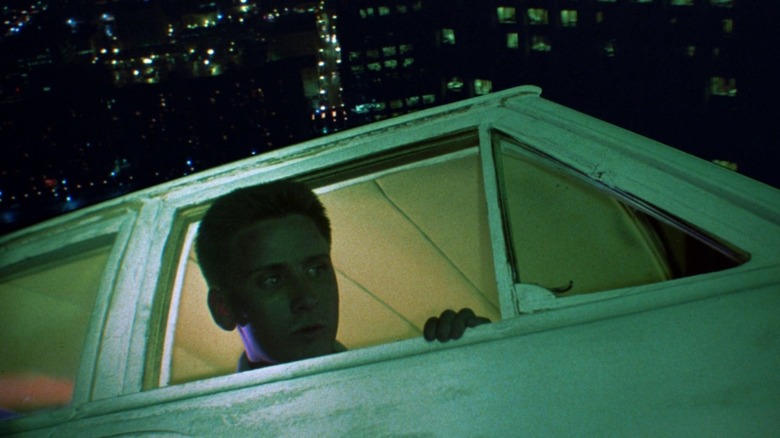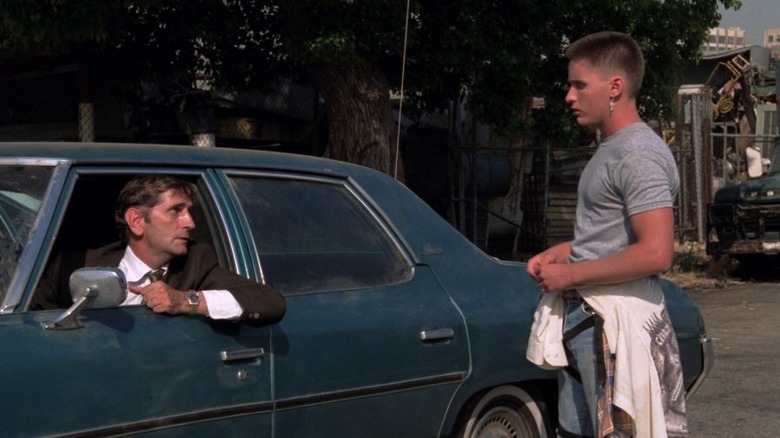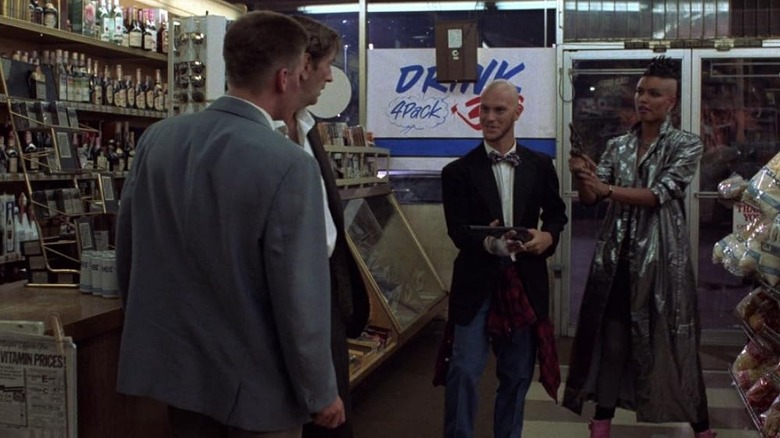Sci-Fi Classic Repo Man Took Ideas From Two Movies You've Never Seen
Alex Cox's 1984 punk rock sci-fi riot "Repo Man" is one of the defining films of its decade. It follows a disaffected punker named Otto who resents that he has to take a wage-slave job in the blasted-open, comedically meaningless landscape of Reagan's America. He finds solace and job satisfaction as a repo man, serving as the angry inversion of consumer culture. If we are defined by what we consume, then the repo man robs us of meaning, laying bare the fragility of modern economics. Also, be sure to keep your middle fingers highly raised at all times.
The magical McGuffin of "Repo Man" is an elusive 1964 Chevy Malibu, marked for repossession. The driver, however, is J. Frank Parnell (Fox Harris), and he seems to be unbalanced, having had a lobotomy at some point. Also, his trunk contains the corpse of a radioactive alien. Whenever someone tries looking in the trunk, they are immediately vaporized. The film feels apocalyptic, as if the world is crumbling. The punk rockers have the right idea, dismissing everything with utter contempt, ignoring money, and learning to roll with the unexpected alien absurdities. It's a glorious, glorious picture.
"Repo Man" notoriously didn't do well at the box office when it was released, but was granted a re-release later in the year when its soundtrack record sold so well.
The making of "Repo Man" was about as wild as the film itself, and the filmmakers were interviewed by Inverse in March 2024 about its inception and execution. It seems that Cox wrote his script based on an unmade movie of his called "The Hot Club" and a script written by "Repo Man" actor Dick Rude called "Leather Rubberneck." Cox sort of amalgamated those two scripts, and "Repo Man" was their mutant child.
'The Hot Club' and 'Leather Rubberneck'
The producer on "Repo Man" was Jonathan Wacks, and, according to the oral history with Inverse, he presented Alex Cox with a contest of sorts. Each of them would write a screenplay for an upcoming movie project. Whoever had the better screenplay would become the director of the project. This was when they were very young, and Wacks fresh out of film school, taking whatever job he could to survive. Wacks fellow producer Peter McCarthy spoke about how they transformed a disused mortuary into an editing bay, editing student short films for a few bucks, and then how they were subsequently kicked out of that space and forced into a dumpy office in the dumpiest part of Venice, California.
Cox approached Wacks about making a feature, even though that wasn't really on the company's radar. Cox, a British import, was eager to get started on something and brought by a few scripts on his motorcycle. "We had a meeting and decided we would write a screenplay for a feature, " Wacks said, "and whoever's was chosen would get to direct. Alex came back in a couple of weeks with a script called 'The Hot Club.'"
Wacks doesn't say what "The Hot Club" was about, other than it was a bleak, apocalyptic story. Eventually, the script was tinkered with and reworked to include dialogue from a real-life repo man they knew, a man named Mark Lewis. It's said that Harry Dean Stanton's character in "Repo Man" is a fictionalized version of Lewis.
This was the early 1980s, and Los Angeles was birthing a vibrant and exciting hardcore punk underground, a scene that Cox very much admired. The punk element of "Repo Man" was introduced by an aspiring actor Cox knew named Dick Rude.
Alex Cox, Dick Rude, and the punk scene
Rude plays the role of Duke in "Repo Man," and it seems that Rude was one of the big reasons why Cox became so entrenched in L.A.'s punk scene. Cox was a film student who moved to Los Angeles in 1977 to study film at UCLA, and punk rock was fascinating to him.
Rude, meanwhile, was attending acting classes, writing scripts, and also trying to get his career off the ground. He and Cox had even spoken about making one of Rude's screenplays into a feature, but they could never get the project off the ground. Eventually, Rude's drama made its way into the amalgamated screenplay for "Repo Man." Rude said:
"I was a teenager going to the Lee Strasberg Theatre Institute in Los Angeles. I wrote a script called 'Leather Rubberneck' with a friend of mine from school, about two kids who get drafted. Alex wanted to make the film, but it didn't pan out. So he incorporated it into Repo Man. A lot of the characters, some of the dialogue, some of the ideas, there was quite a bit of it that was used in 'Repo Man.'"
Cox, who lived next to Lewis, would ride around, having conversations, and jotting down additional dialogue. At some point, the project turned into a twisted sci-fi story. Once the script was finally cobbled together, the producers started looking for funding, and found a great deal of financial support from, of all people, Mike Nesmith of The Monkees. The rest, as they say, is history. The film, after its re-release, played in a single theater in New York for 18 straight months, earning $4 million. A hit, as cult films go.


